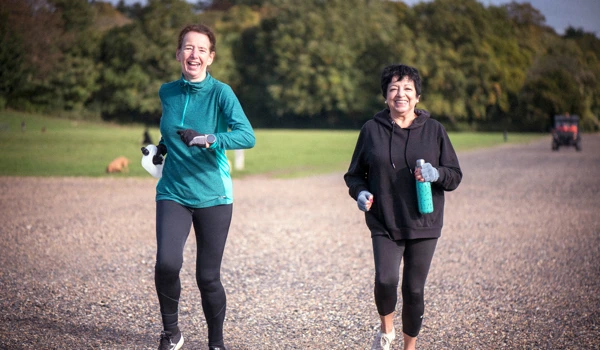Looking after your mental wellbeing in later life
Living a healthy lifestyle in old age is not just about looking after your physical health and fitness, but about making sure that you look after your mental wellbeing, too.
From loneliness and isolation to death of a loved one or lack of purpose, later life comes with many tough challenges, meaning older people are among some of the most vulnerable to experiencing mental health problems. And, with 1 in 5 older people living in the community and 2 in 5 living in care homes experiencing poor mental health, it’s important to recognise that you are not alone and that many of us – at some stage – feel unable to cope.
There is absolutely nothing to feel ashamed or embarrassed about. If you think you may need help, it’s important to reach out to those around you.
Common mental health issues in older people
Depression in later life
According to the Mental Health Foundation, depression affects around 22% of men and 28% of women aged 65 years and over, making it the most common mental health issue experienced by people in later life.
Despite this, an estimated fewer than 1 in 6 older people with depression actually seek help from their GP.
Common symptoms of depression include:
- Constantly feeling down, sad or hopeless
- Feelings of worthlessness and low self esteem
- Difficulty concentrating
- Losing interest in things and a lack of enjoyment
- Restlessness
- Isolating oneself from friends, family and loved ones
- Changes in appetite as well as eating more/less than usual
If you think you may be suffering from depression, contact your GP or seek counselling. Through medication, therapy or a combination of both, it is possible to overcome depression and associated symptoms.
Stress in later life
We are all face with stress throughout various stages in our lives, and although later life is often look at as a time of stress-free retirement and relaxation, it can come with its own set of difficult circumstances. Commonly, older people may face stress due to:
- Financial worries
- Caring for a sick partner or worries about them dying
- Caring for grandchildren
- Feeling like a burden
- Not seeing family members as often
- Friends and family passing away
- Worries about getting older or dying
- Concerns for personal safety
Stress can cause a number of different symptoms, effecting how you feel both mentally and physically. You may feel irritable, fearful or anxious and may find it difficult to concentrate. Physically, you may have headaches, a pounding heartbeat and trouble sleeping.
Share your worries with a loved one and make sure you get plenty of sleep, exercise and healthy foods in your diet. Try some calming breathing exercises and try not to rely on alcohol, smoking or caffeine as a way of dealing with your feelings.
Anxiety in later life
Similar to stress, anxiety is a feeling of worry, fear or uncertainty. It’s common for most of us to feel anxious at certain times, but in some cases, these feelings can become unmanageable and can affect the way you live your daily life.
Symptoms of anxiety include:
- Restlessness and constantly feeling on edge
- Irritability
- Trembling, shaking and a noticeably strong or irregular heartbeat
- Shortness of breath
- Feeling sick and stomach aches
There are a number of anxiety disorders that people can suffer from, most commonly generalised anxiety disorder, social anxiety disorder, panic disorder, phobias, and obsessive-compulsive disorder.
If you feel you may be suffering from an anxiety disorder, or if your feelings of anxiety are getting in the way of your daily life, go and see your GP who can offer the best treatment solution for you.

Top tips for looking after your mental health in later life
Eating well
What we put into our bodies can massively impact how we feel, with many scientific studies showing that eating a well balanced diet has been associated with positive wellbeing. A 2017 study into the Mediterranean diet – which has long been viewed as one of the best diets to follow for a healthy lifestyle – found that those who ate more vegetables and legumes saw improvements in their mental health and even helped reduce feelings of depression.
Avoid foods with high sugar and salt content and don’t drink too much alcohol.
Read our top tips on eating well in later life.
Staying busy
Being retired doesn’t have to mean sitting around the house waiting for the days to pass. Staying active, busy and mobile is a great way to look after your mental health and overall wellbeing.
Use your free time to pursue interests, hobbies or start DIY and home improvement projects. Loneliness and isolation can massively contribute to poor mental health, so try to stay in touch with your friends, family and loved ones regularly or join clubs and social groups in your local community.
Getting plenty of exercise
From improving heart health and joints to preventing a number of illnesses, the list of benefits associated with exercise are endless. But aside from the physical benefits, exercise is great for your mental health, too.
Take care of your mental wellbeing by ensuring you get at least 150 minutes of moderate aerobic exercise a week. This may include:
- walking
- cycling
- dancing
- tennis
Read our top tips on getting enough exercise in later life.
Increasing your sense of purpose
Adjusting to life in retirement can be tricky. Transitioning from a life of employment to suddenly having lots of free time on your hands may take some getting used to.
Keeping that sense of purpose will help protect your own mental wellbeing. You can do this by:
- volunteering at an event or local charity shop
- becoming a trustee
- spending time with your grandchildren
- dedicating your time to your own hobbies and interests
- getting a pet, such as a dog or cat
What to do if you’re feeling down
If you think you are suffering from a mental health issue, it’s important to recognise this early on and seek help before your symptoms worsen or become difficult to manage.
Reach out to a loved one, friend or family member and discuss how you have been feeling.
Book an appointment with your GP and explain your situation. From there, you may be referred to therapy, counselling or prescribed an antidepressant.
Remember, you are not alone and it is very possible to overcome mental health issues. If you need someone to talk to, the Samaritans have a free 24 hour helpline offering confidential support and guidance to people who are feeling low. You can call them on 116 123.
What to do if you’re worried about the mental wellbeing of a loved one
People who are struggling with mental health issues can often be secretive or embarrassed about the way they are feeling, so it may be difficult to tell if your loved one is suffering with poor mental wellbeing.
Look out for signs that they are struggling, such as:
- isolating themselves
- lack of interest in things they used to care about
- not eating enough
- eating too much
- not wanting to leave the house
- not being able to relax
- changes in mood
- snapping / agitation / irritation
Make them feel at ease by letting them know that you’re there if they want to talk without putting pressure on them to open up. Show them that you understand how serious mental health issues are, and that you know they can’t just ‘be happy’ or ‘snap out of it.’
Gently encourage them to seek help from their GP or attend counselling sessions. Make sure they don’t isolate themselves and check in with them as often as you can.
Next steps

Healthy eating and nutrition in later life
Eating healthily is important for all of us no matter what stage of life we’re in, however ensuring you have plenty of nutritious foods in your diet throughout later life will help you stay active and healthy for longer.

Exercise advice for people over 65
Living an active lifestyle is a good idea for all of us, with even small levels of exercise and activity massively contributing to overall physical and mental health.

Getting a good night's sleep
We all experience difficulties staying or falling asleep sometimes, however these issues are particularly common in older people due to the natural changes that our circadian rhythms go through as we age.
